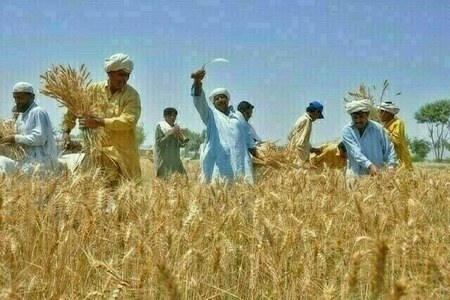Zinc Wheat Variety Boosts Pakistan’s Agricultural Sector
The extensive planting of the drought-resilient and bio-fortified zinc wheat variety, Akbar-2019, in Pakistan has mitigated the impact of an anticipated 10% decrease in wheat production this season and spurred more than USD 85 million in annual investments in the nation’s seed industry, according to expert analysis.
Despite severe drought-like conditions during the 2024–25 Rabi season, wheat yields have remained comparatively steady because of the hardiness of zinc wheat. Akbar-2019 alone comprises 42% of Pakistan’s total wheat cultivation area.
This particular variety is projected to yield around 15 million metric tons of zinc-enriched grain out of the country’s estimated total wheat production of 28.42 million metric tons, cultivated across over 9 million hectares.
Experts suggest that cultivating approximately 178,000 metric tons of certified zinc wheat seeds during the current growing season has revolutionized both agricultural output and nutritional value. This year, the market value of zinc wheat grain is expected to surpass USD 5 billion.
Progress has been facilitated through strong partnerships between the public and private sectors, with private seed companies contributing approximately 80% of the USD 85 million investment.
Zinc wheat varieties are bio-fortified, containing increased zinc levels — a vital micronutrient that bolsters immune function, aids child development, and fosters cognitive growth. Their enhanced nutritional profile renders them particularly beneficial for Pakistan’s low-income and rural populations, where zinc deficiency remains a widespread public health concern.
According to Dr. Yaqub Mujahid, Country Manager at HarvestPlus Pakistan, a prominent organization in the global bio-fortification movement, “Bio-fortified zinc wheat has demonstrated that investing in climate-smart and nutrition-sensitive agriculture is no longer a choice but a necessity for the nation’s economic progress and nutritional well-being.”
The success of Akbar-2019 further exemplifies the possibilities of incorporating bio-fortified crops into wider agricultural policy and investment structures.
Dr. Javed Ahmad, Director of the Wheat Research Institute Faisalabad, highlighted HarvestPlus’s impact on fostering innovation and acceptance. He stated, “We appreciate our enduring collaboration with HarvestPlus on creating and expanding bio-fortified crops, stimulating economic growth within the nation, and contributing to our food security and nutritional objectives.”
HarvestPlus has played a critical role in guiding public and private sector endeavors to create and encourage zinc wheat in Pakistan, thus opening up new opportunities for seed innovation, farmer engagement, and supply chain advancement.
Specialists believe that broadening bio-fortification to encompass other key staple crops can significantly expedite Pakistan’s advancement toward enhanced food and nutritional security.
Dr. Mujahid noted that solidifying the value chain for bio-fortified foods and integrating bio-fortification into agricultural policy will be crucial in establishing a nutritionally sound and food-secure country. He added that continued private sector involvement, policy backing, and donor investment are vital for scaling up these achievements and guaranteeing enduring resilience.



Comments (0)
No comments yet. Be the first to comment!
Leave a Comment